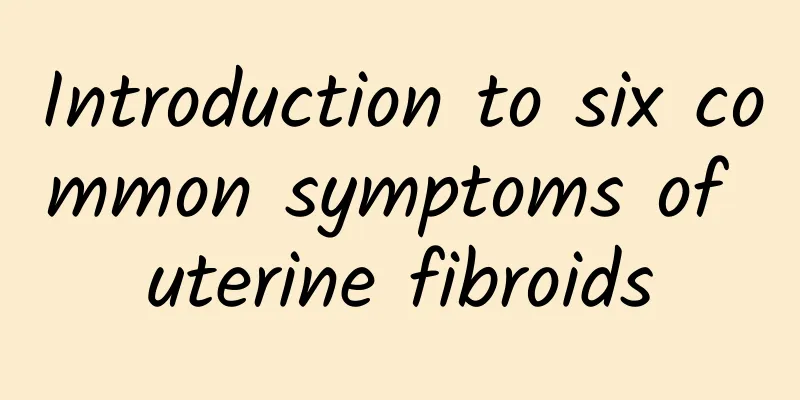Introduction to six common symptoms of uterine fibroids

|
Uterine fibroids are a common tumor that grows in the uterus. Most of them are benign tumors and can be completely cured as long as they are removed in time. What are the common symptoms of uterine fibroids ? Here are some common symptoms of uterine fibroids. In general, common symptoms of uterine fibroids include: 1. Menstrual changes: This is the most common symptom of uterine fibroids, manifested as shortened menstrual cycle, increased menstrual flow, prolonged menstrual period, irregular vaginal bleeding, etc. 2. Increased vaginal discharge: Increased vaginal discharge. Sometimes this symptom of uterine fibroids will produce a large amount of purulent and bloody discharge and necrotic tissue discharge with a foul odor. 3. Pain: Generally, patients do not have abdominal pain. Symptoms of uterine fibroids often include lower abdominal distension, back pain, etc. When the subserosal fibroid pedicle is twisted, acute abdominal pain may occur. When the fibroid turns red, the abdominal pain is severe and accompanied by fever. It can usually be relieved with the Chinese medicine Shijie Gao. 4. Compression symptoms: Myomas grow forward or backward, compressing the bladder, urethra or rectum, causing symptoms of uterine fibroids such as frequent urination, dysuria, urinary retention or constipation. When myomas grow to both sides, they form broad ligament myomas, which compress the ureter and cause hydroureter or renal pelvis; if they compress pelvic blood vessels and lymphatic vessels, they can cause lower limb edema. 5. Secondary anemia: If the patient has excessive menstruation for a long time, it may lead to secondary anemia, with symptoms such as general fatigue, pale complexion, shortness of breath, and palpitations. This is also a common symptom of uterine fibroids. 6. Hypoglycemia: Hypoglycemia associated with uterine fibroids is also rare. The symptoms of this type of uterine fibroids are mainly low fasting blood sugar, loss of consciousness and even shock. The symptoms can completely disappear after glucose injection. The symptoms of hypoglycemia will completely disappear after the tumor is removed. The above is an introduction to the common symptoms of uterine fibroids. I hope it will be helpful to everyone. Once the symptoms of uterine fibroids appear, you must go to the hospital for treatment in time to avoid serious delays in the disease. |
<<: Briefly explain: Three common uterine fibroid surgeries
>>: Six major hazards of uterine fibroids that need attention
Recommend
Can threatened abortion be cured with Chinese medicine?
Traditional Chinese medicine is a traditional Chi...
Three common causes of ovarian cysts
There are many medical factors related to the ons...
Adnexitis may differ in acute and chronic forms
Adnexitis may be different in acute and chronic s...
Which hospital is best for treating hyperprolactinemia?
Sitting and waiting for death is not an option fo...
Cervicitis and cervical cancer are not the same thing
As cervicitis becomes more and more common, many ...
What causes cervical erosion? These causes can cause cervical erosion
Cervical erosion is a common gynecological diseas...
How to treat secondary amenorrhea with traditional Chinese medicine
The TCM treatment of secondary amenorrhea focuses...
A must-learn for those who eat out! 6 Principles of Picky Eating
If you want to lose weight quickly and effectivel...
Daily care for endometriosis
Patients with endometriosis should pay attention ...
Cervical erosion folk remedies
In life, many women have been affected by cervica...
What are the symptoms of left ovarian cyst?
Ovarian cysts are a type of ovarian tumor. Althou...
What are the typical symptoms of vulvar leukoplakia?
Vulvar leukoplakia does bring a lot of pain and i...
How big are multiple uterine fibroids before surgery is needed? Methods for preventing multiple uterine fibroids
Although uterine fibroids are a benign tumor, due...
How to distinguish between cervicitis and cervical erosion? What causes cervicitis?
Nowadays, many people are paying attention to ute...
Causes of vulvar leukoplakia
What are the causes of vulvar leukoplakia? There ...









